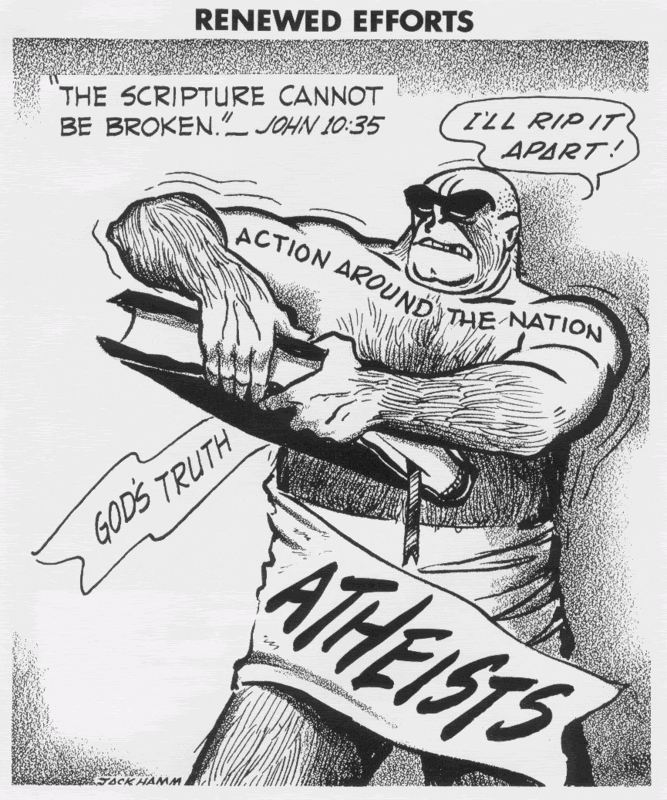
Atheists of every stripe agree that all the gods of human religions are false; that these gods do not have magical, supernatural powers; that they do not answer prayer, heal the sick, or raise the dead. These gods are made and shaped by human hands and do not, as many religionists suggest, live beyond the space-time continuum.
Atheism is the absence of belief in the existence of gods. While there may be a God that has not yet revealed itself to us, such a possibility is improbable. Most atheists are comfortable living their lives with no thought of God or religion. Living such a life perplexes religious people, particularly Evangelical Christians. Unable to rationalize why anyone would ever reject the wonderful love and grace of Jesus, some Evangelicals make inflammatory, false statements about atheists: atheists are immoral, atheists secretly desire to commit sexual sin, atheists hate God, atheists are servants of Satan (in whom atheists also do not believe), to name a few. While it is certainly true that atheists can do bad things, I know of no study that concludes that atheists act better or worse than Evangelicals. People are people, and humans can do awful things, regardless of what they believe about the existence of God.
Many Christians believe that Christianity gives them a one-up morally on the rest of the world. According to their core beliefs, Evangelicals are saved and sanctified and have the Holy Spirit living inside them. Not only that, but God has given to them a divine road map for life — the Bible. Evangelicals, then, SHOULD be morally superior to the unwashed, uncircumcised Philistines of the world. That they aren’t reveals that many Christians don’t practice what they preach.
A religion need not be true for people to benefit from it. I would be the first to admit that millions of Americans find great value in religious beliefs and practices. While it could be argued that — for Christianity in particular — removing God’s judgment and fear of Hell from the equation would empty Christian churches overnight, many religions do not have such beliefs. Yet, millions of people devote themselves to their teachings and practices. I am more inclined to believe these days, after fourteen years of interacting with progressive and liberal Christians, that people can intellectually abandon (or compartmentalize) many of the teachings of Christianity, yet hang on to a spiritualized form of Christianity that focuses on a cosmic Christ and doing good works. This brand of Christianity bears little resemblance to historic Christianity, yet it “works” for millions of people. Why is this?
The best way to understand religious belief in general and Christianity in particular is to view both from a sociological and economic perspective. Strip away all the dogma, and what’s left? A group of people joined together with common wants, needs, and desires. Years ago, Polly and I visited the Episcopal church in Defiance, Ohio. One member came up to us before the service and let us know that the church didn’t care what we believed. Coming from an Evangelical and Baptist background, we found such a notion shocking. Beliefs matter! Right? In Evangelical churches, beliefs matter, but outside of Evangelicalism, thousands of churches are indifferent to the internecine wars fought over doctrine. These churches just want to love God, love others, be happy, and do good works. For them, church is a social or family gathering, a place where people are accepted as they are.
Humans are social animals, so it shouldn’t surprise anyone that one of the biggest draws for religious groups is the social connectivity they offer to attendees. From this perspective, churches aren’t any different from humanist or atheist groups, nor are they any different from clubs such as the Lions Club, Kiwanis Club, Moose Lodge, Amvets, VFW, Facebook, or any of the political parties.
We humans tend to gather together based on shared beliefs, practices, and ideals. We enjoy hanging out with like-minded people. When we view religions from this perspective, it becomes easy to see why most Americans are church members or part of a religious group. When we throw in the fact that religion gives people a moral framework to live by and answers the two big questions of life: what is my purpose and is there life after death? — it is not surprising that religion continues to flourish.
One of the weaknesses of atheism is that it doesn’t provide social connections (nor is it meant to). One of the things that former Christians miss is that sense of belonging to something bigger than themselves. Former believers also miss the communal fellowship found in churches. More than a few former Evangelicals have written me expressing how lonely they felt once they became unbelievers. While there are atheist and humanist groups that provide social connectivity, for the most part, particularly for people who don’t live on the east/west coast or in a major city, atheists and humanists are on their own.
Let me conclude this post by looking at religion from an economic perspective. To properly understand why people are members of a particular religion/church, we must do a cost-benefit analysis. Being a part of a religion/church costs something. This is what I call the price of admission. One of the hardest things to get Evangelicals to admit is that to become a Christian/church member requires some sort of payment, be it a denial of self, a repudiation of certain behaviors, financial contributions, or as pastors are fond of saying: God wants you to give your time, talent, and money.
People attend church Sunday after Sunday, oblivious to the fact that every time they walk through the doors, a membership fee is required of them. It’s only when congregants become unhappy or disgruntled that they do a cost-benefit analysis. What am I getting out of this? they ask. They begin to wonder if the price of admission is worth it; are they getting more in return than what it costs? If unhappy Evangelicals conclude that they no longer receive what they should for their payment, they begin a process called “church shopping.” Feeling that their needs are not being met or they aren’t being “fed,” Christians visit other churches hoping to find a congregation that will better suit their needs. In other words, they are looking for a religion/church where the benefits outweigh the costs.
Evangelicalism is numerically in decline. The reasons for this are many: exclusionary practices, right-wing politics, support for Donald Trump, anti-abortion rhetoric, Puritanical sexuality, and anti-LGBTQ beliefs, to name a few. In particular, Evangelical churches are hemorrhaging younger adults, losing the very people who are supposed to be the future of Evangelicalism. These younger adults have decided that the cost of being Evangelical church members outweighs the benefits. And so they leave, swelling the ranks of Americans who are indifferent towards organized religion — the NONES.
As the United States becomes more secular and less religious, religious leaders and pastors think that the solution to this seismic change is to double down on their particular beliefs and practices or develop programs that will attract unbelievers or help retain church members. These approaches have failed spectacularly, and until an honest accounting is given as to why people stay or leave, sects and churches will continue to see membership (and financial) loss. Until sects admit that their church planting efforts do little to “reach the lost,” but, for the most part, just cannibalize already established churches, they shouldn’t be surprised when new members gained at one point leave when the latest, greatest church with the most awesome pastor ever comes to town. Christians are no different from anyone else. They seek that which will give them the greatest benefit for the least cost, and as long as the benefits outweigh the costs, their asses will remain firmly ensconced in the pews. But when the equation flips and costs outweigh benefits, LOOK OUT!
Bruce Gerencser, 68, lives in rural Northwest Ohio with his wife of 47 years. He and his wife have six grown children and sixteen grandchildren. Bruce pastored Evangelical churches for twenty-five years in Ohio, Texas, and Michigan. Bruce left the ministry in 2005, and in 2008 he left Christianity. Bruce is now a humanist and an atheist.
Your comments are welcome and appreciated. All first-time comments are moderated. Please read the commenting rules before commenting.
You can email Bruce via the Contact Form.







